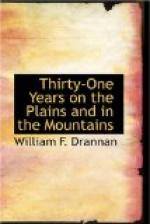I must admit that when I learned Jack’s story of the way that he had been both driven and pulled into this war, which I knew to be a fact myself, I was sorry for him. He said that after the Indian agent would not send them anything to eat he was forced to go away from the reservation to catch fish to keep his people from starving, for which purpose he was at the mouth of Lost river when the soldiers came there. One morning before the soldiers fired on him without even telling him to return to the reservation or giving him any warning whatever. He said that he did not give orders for his men to kill any white men that morning, but they all got very angry at the soldiers for shooting at them. “That day,” said he, “I go to lava bed, my men scout all over country, kill all white men they see.”
After I was through talking with Jack, Gen. Wheaton sent for me to come to his quarters, as he was anxious to learn what information I had obtained. When I told him the number of Indians yet in the cave and that they had nothing to eat, he asked me what would be my plan for capturing the remainder. I told him that if I was doing it, I would capture the entire outfit without losing a single man, but that it would take a little time; that I would not fire on them at all, but would double the picket line, and it would not be many days until they would surrender, and in case some of them did slip by the guards, we would pick them up before they got twenty miles away.
The following morning a council was held in camp, and all the commissioned officers were present. Now Captain Jack had been captured, and according to reports, the other Indians were nearly starved out, so that morning they did not open out on them at all.
The third day from this it was reported by a citizen who had passed over the country that day, that he saw Indians up on Tule Lake. It being late in the afternoon, nearly dark in fact, when I heard the report and it not being from a scout, I questioned closely the man who was said to have seen them, but did not get much satisfaction from him, so naturally discredited the report. But for fear there might be some truth in it, the next morning by daybreak George Jones and I were scouring the country in the vicinity of Tule Lake. After having ridden some little distance we ran upon the trail of six Indians, who as we supposed had passed the evening before, and were evidently plodding along in the direction of Lost river. This was without doubt the trail of four bucks and two squaws. After we had followed this trail a few miles we found where they had stopped, built a fire, caught, cooked and ate some fish. We knew they were not many miles ahead of us, in fact, the fire had not entirely gone out. From here on we had plain sailing, and the nearer an old scout gets when on the trail of an Indian the more anxious he gets, so we sped along up the lake four miles further, and were on them before they knew it; they were all on the banks of the river fishing.




